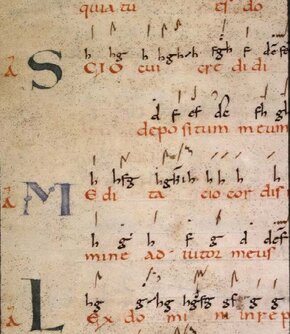Workshop „New Insights Into Gregorian Chant Tradition“ mit Olivier Cullin, Jean-François Goudesenne und Susana Zapke
What we can read, what we can understand, what we can sing?
Univ.-Prof. Dr. Olivier Cullin, Université de Tours
Taking the example of communion Nemo te condemnavit, we will approach the writing/oral relationship and their conflicts. We will question the nature of singing and what we can understand, offering some reflections on the meaning of what a „tradition“ is.
„Die nicht temperierte Psalmodie“: Cantus Intonation in the first Millenium: Envisioning new Chant Performances
Dr. Jean-François Goudesenne, Institut de Recherche et d’Histoire des Textes-CNRS-Orléans
Both musicologist and keyboard player Goudesenne, practising tuning in 16—17th c. instruments asks why Gregorian Chant remains systematicly performed by singers on the „wohltemperierte“ scale of the post Schönberg habitus. The example of the Canticum Danielis, Benedictus es in firmamento in the Dijon-Montpellier codex with double neumatic and alphabetic volpiano a-p notation, with the help from an antique 7 chords lyra, will permit us to perform psaltic art by using microtones, mostly inspired by Greek Byzantine chant usages, based on different tetrachords (here the synemenon). Students are invited to experiment pythagorician principles (for the main structures of the scales), combined with mobile (unstable) pitches according to genres (a little bit like Greek Antique system), shaping then rhetoric effects and the ethos concept in the peculiar contexts of liturgy.
This approach, formerly considered as „exotic orientalism“ imposes itself nowadays as a main esthetic stake of creativity for interprets of Ancient music, as important for the music langage as Rameau for tonal system around 1700.
Aktive Teilnahme nur für Studierende der MUK.





